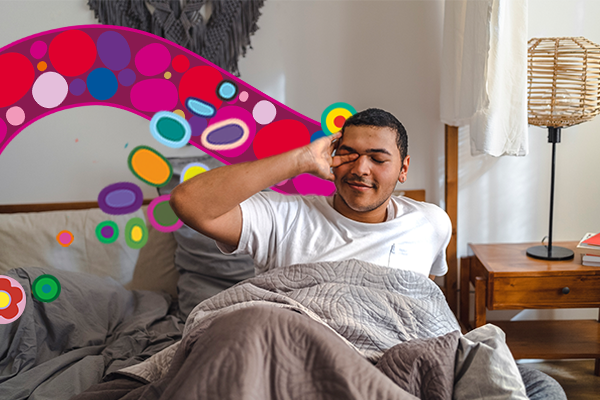What to expect when you see a psychologist

It could be lovesickness or heartbreak, or the death of someone close to you. It could be a stressful job, a difficult family relationship, or having trouble making changes in your life. Or you could be feeling anxious or sad all the time, and not even be able to pinpoint why. Whatever it might be, it’s safe to say that there are plenty of reasons why you might seek help for your mental health.
Psychologists are there to help you feel better, with strategies for managing your thoughts and feelings. Just as you would go to the doctor to treat an infection or injury, psychologists are experts on the human mind and have evidence-based tools for treatment. And yet, we often don’t think about our mental health in the same way as our bodies. For a lot of us, the idea of seeing a psychologist can feel pretty daunting. Often, it comes with feelings of shame, embarrassment or fear.
If this is you, it might help you to know that 10 per cent of Australia’s population received Medicare-subsidised, mental health-specific services in 2022–2023. Those services include seeing a psychologist. Understanding what a psychologist does, and what to expect when you see one, can also help manage those feelings.
Read on to find out all about psychologists, and how one could help you.
What does a psychologist do?
There are lots of myths and misconceptions about what psychologists do, which can contribute to people’s discomfort – and movies and television often don’t help. The common image of a patient on a couch, talking to a psychologist who has almost magical mind-reading powers, couldn’t be further from the truth. The fact is that psychology is a science, and this is what psychologists use to help people.
There are several types of psychologists, and which one you see will depend on your needs. Here are some of the most common ones you’re likely to come across:
Psychologists with general registration
Also known as registered psychologists, this is the most common type of psychologist in Australia. These psychologists have a minimum six years’ university training and supervised experience, and engage in ongoing education. They assess, diagnose and treat a wide range of people and issues, using evidence-based approaches that are appropriate for the individual.
Clinical psychologists
These psychologists have had additional training to provide services to help people with a range of mental health conditions. With a minimum of 8 years’ university training, they assess, diagnose, and treat mental illnesses and psychological problems using a variety of therapies and techniques.
Counselling psychologists
These psychologists work with people to help with a range of mental health disorders and issues like anxiety, depression, and substance abuse. They also help people who are going through challenging situations like grief and loss, relationship issues, life transitions, and domestic violence.
Clinical neuropsychologists
These psychologists specialise in assessing, diagnosing, and treating people who have brain disorders that affect functions like memory, learning, attention, language, reading, solving problems, and making decisions.
Whichever type of psychologist you might consult with, they will be doing much more than just listening to you vent. There are lots of different therapies and techniques a psychologist might use to help you. Some of the most common ones include cognitive behavioural therapy (which teaches you to challenge unhelpful thinking patterns) and interpersonal therapy (which focuses on dealing with relationships you find difficult).
Wondering about the difference between a psychologist and a psychiatrist? Read more here: Psychiatrist vs psychologist.
Costs for seeing a psychologist
You can see a psychologist without a referral from your GP, but you will need one to get a Medicare rebate. You don’t need a referral to see a psychologist to claim for sessions if you have Medibank Extras cover with mental health support included. Let’s go through each option in turn.
For a referral to see a psychologist, you will need to visit your GP. After asking you some questions about what’s going on and how you’re feeling, they may decide to refer you to a psychologist and write you a Mental Health Care Plan (MHCP). An MHCP allows you to access Medicare rebates for up to 10 individual sessions with a mental health professional (like a psychologist) each calendar year. You should be aware that in many cases the rebate does not cover the full cost of a psychology session, and you will likely also have to pay an out-of-pocket fee. What you get back from Medicare will depend on the type of treatment and psychologist you see.
For more than 10 sessions in a calendar year, you will need to pay the full fee.
If you don’t wish to get a referral to see a psychologist, or you’ve already used up the sessions subsidised by Medicare under your MHCP, you may want to use your private health insurance instead. Medibank Extras cover, with mental health support included, pays benefits towards consultations with a psychologist, Medibank-recognised counsellor or mental health social worker.§
How much you get back will depend on your level of Extras cover and remaining annual limit.
Which option you use first – your extras cover or the Medicare subsidy under an MHCP – is up to you and your individual circumstances. The only thing to keep in mind is that you can’t claim on both your extras cover and Medicare for the same consultation: it must be one or the other.

24/7 Medibank Mental Health Support
Medibank health insurance members can chat to a mental health professional about how they feel and ask questions about a range of mental health concerns for themselves or a loved one and get guidance on what they can do next. Chat online or call 1800 644 325 anytime of the day or night, 7 days a week at no extra cost.~
What happens in your first session with a psychologist
It’s natural to feel nervous about your first session. Psychologists understand that you may be feeling vulnerable about opening up and sharing personal details with someone new.
One of the first things that should happen is for the psychologist to explain what you need to know about privacy, confidentiality, access to information, and other aspects related to the Psychology Board of Australia’s code of ethics and professionalism. This can happen beforehand, possibly through your intake form, or in your first session.
Your first session is all about setting up the foundation for your therapy, so you can expect some questions, like:
- Why you came to see the psychologist
- What’s happening in your life
- What you’re hoping to achieve from the sessions.
It’s common for your psychologist to take notes while you answer the questions; this is so they can refer to your answers when necessary.
By answering the questions openly and honestly, you’ll help your psychologist understand how they can best help you.
You can also ask questions of your own. In fact, it might be helpful for you to jot them down before you go in so that you don’t have to worry about remembering them during the session. Things you might want to ask include:
- How they work, and what therapies/techniques they use
- How often they recommend you see them, and for how long
- Can they help you achieve your goals.
Getting the most out of therapy
Forget the couch: sessions with a psychologist aren’t meant to be passive. The best way to get the most out of your sessions is to be an active participant. Be open with your psychologist, and approach your relationship with them as a collaboration where you are both working to improve your mental health.
Ways to be active include:
- Setting aside an appropriate amount of time, including travel, for your sessions
- Eliminating distractions during your sessions (for example, silence or turn off your mobile phone). If you’re having telehealth appointments, make sure that you have a private, safe space to talk to your psychologist
- Doing “homework” tasks your psychologist may ask you to do between sessions
- Practicing new skills and tools your psychologist may teach you
- Jotting down notes between sessions about things you’d like to discuss with your psychologist, or questions you’d like to ask them.
And if you don’t feel comfortable with your psychologist, it’s perfectly okay to look around for someone else. Trust is essential, so it’s worth finding one you click with.
To find a psychologist near you, you can search the Australian Psychological Society directory.
Your mental health is just as important as your physical health. It’s common for people to go to a GP as soon as they notice something is wrong with their physical health: this is because they understand that the earlier you go, the more likely it is that it can be fixed quickly. It’s worth treating your mental health the same way, and reaching out for professional help sooner rather than later.
Where to get help
If your life or someone else’s is in danger, call 000 immediately.
If you’re in distress and need help, call Lifeline on 13 11 14 for 24/7 crisis support.
For non-emergency support, your GP or regular health practitioner is often the best place to start. They will be able to assess your individual situation and recommend the best next steps for your recovery.
Medibank health insurance members can chat to a mental health professional about how they feel and ask questions about a range of mental health concerns for themselves or a loved one and get guidance on what they can do next. Chat online or call 1800 644 325 anytime of the day or night, 7 days a week at no extra cost~.
Remember that help is always available, no matter the situation.
How can we help?
I want to know how my cover supports mental health
I need help and want to talk
Related articles
Things you need to know
~Some referred services may involve out of pocket costs and waiting periods may apply.
§ Annual limits apply. Counsellors must be registered with Australian Counselling Association, Psychotherapy and Counselling Federation of Australia, Australian Traditional Medicine Society.
While we hope you find this information helpful, please note that it is general in nature. It is not health advice, and is not tailored to meet your individual health needs. You should always consult a trusted health professional before making decisions about your health care. While we have prepared the information carefully, we can’t guarantee that it is accurate, complete or up-to-date. And while we may mention goods or services provided by others, we aren’t specifically endorsing them and can’t accept responsibility for them. For these reasons we are unable to accept responsibility for any loss that may be sustained from acting on this information (subject to applicable consumer guarantees).











































